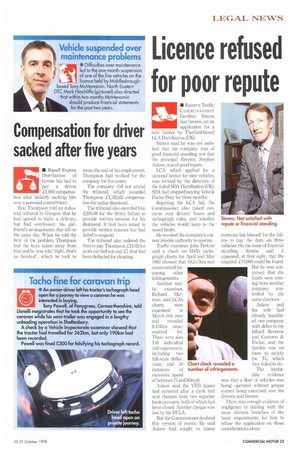Licence refused for poor repute
Page 25

If you've noticed an error in this article please click here to report it so we can fix it.
• Eastern Traffic Commissioner Geoffrey Simms has thrown out an application for a new licence by Thetford-based LCA Distribution (UK).
Simms said he was not satisfied that the company was of pod financial standing, nor that the principal director, Stephen Askew, was of good repute.
I,CA, which applied for a national licence for nine vehicles, was formed by the directors of the failed SDA Distribution (UK), SDA had stopped paying Vehicle Excise Duty for three months, Rejecting the LCA bid, the Commissioner also raised concerns over drivers' hours and tachograph rules, and whether the vehicles would keep to the speed limits.
He revoked the company's current interim authority to operate.
Traffic examiner John Perkins said a check on SDA's tachograph charts for April and May 1997 showed that 18,541km was unaccounted for, among other infringements.
Another traffic examiner, Richard Mutimer, said LCXs charts were examined in March this year and revealed 8,431km unac counted for. There were also 148 individual infringements, including two full-scale deflections, and 30 instances of excessive speed of between 75 and 80mph.
Askew said the \FED lapses had occurred after a clerk had sent cheques from two separate bank accounts, both of which had been closed. Another cheque was lost by the MLA.
But the Commissioner doubted this version of events. Ele said Askew had sought to blame
Chart check revealed a number of infringements. everyone but himself for the failure to pay the duty on three vehicles. On the issue of financial standing, Simms said it appeared, at first sight, that the required £10,000 could he found. But he was concerned that the funds were coming from another company controlled by the same directors.
Askew and his wife had already liquidated one company with debts to the Inland Revenue and Customs & Excise, and the burden was on them to satisfy the TC, which they failed to do.
The irrefutable evidence was that a fleet of vehicles was being operated without proper control being exercised over the drivers, said Simms.
There was enough evidence of negligence in dealing with the most obvious breaches of the basic requirements for him to refuse the application on those considerations alone.




















































































































